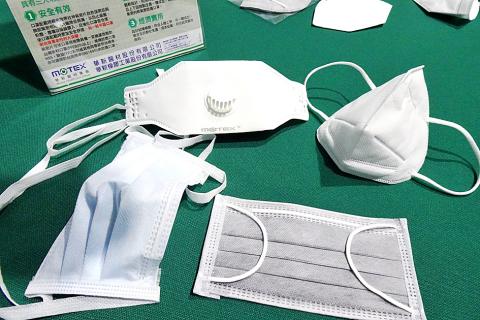Several mask manufacturers cut short their holiday and on Sunday began working to meet surging demand as fears over a fast-spreading new virus escalate, a Ministry of Economic Affairs official said yesterday.
The ministry has asked logistics service providers to return to work and facilitate mask deliveries to retailers, Executive Yuan spokeswoman Kolas Yotaka said, adding that people do not have to stockpile masks as there is enough on the market to meet demand.
Local manufacturers can produce 1.88 million masks per day, the ministry said, adding that they could increase production to 2.44 million per day, or up to 70 million per month.

Photo: Chen Kuan-pei, Taipei Times
To ensure there is enough supply amid fears that the 2019 novel coronavirus (2019-nCoV) could spread domestically, the Customs Administration on Friday last week banned exports of all masks made of woven materials until Feb. 23.
Asked whether the export ban would continue, the ministry official said the ministry would hold a meeting after the holiday, which ends tomorrow.
As there is no sign that the outbreak will ease any time soon, the Executive Yuan is likely to maintain the ban in the short term, the official added.
The ban has come under intense scrutiny from politicians and commentators alike.
Former president Ma Ying-jeou (馬英九) said the government should not be so rigid in regulating mask exports, as the nation has sufficient inventory to meet demand.
“All of us should know how to take better care of our health as the Wuhan pneumonia outbreak is getting worse. Like a war, we should not underestimate the effects of the disease and should be prepared to defend against it. This should be our attitude and our social responsibility,” he said.
“The nation has sufficient inventory [of masks] to meet the demand and [the government] should take this into consideration. The policy does not have to be so rigid,” he said.
Political commentator Joyce Huang (黃智賢) also criticized the ban, saying ministry data showed that local manufacturers produce about 1.88 million masks per day and can increase production to 2.44 million, while the nation needs only 1.3 million masks per day.
On average, the demand for masks increased to about 1.54 million daily during the SARS outbreak in 2003, she said.
The Democratic Progressive Party government should not impose such an unconscionable ban, “no matter how much it hates China,” Huang said.
While some critics said the ban is inhumane, sports commentator Max Shih (石明謹), who is also a police officer, said that it is the critics who are inhumane for making comments without realizing that the nation is also dealing with a tight supply.
“Personally, I would not stop people doing good deeds to others. If Huang and other critics are willing to personally go to Wuhan and distribute masks to people, I am happy to raise funds and buy 10,000 masks for them,” Shih said.

Conflict with Taiwan could leave China with “massive economic disruption, catastrophic military losses, significant social unrest, and devastating sanctions,” a US think tank said in a report released on Monday. The German Marshall Fund released a report titled If China Attacks Taiwan: The Consequences for China of “Minor Conflict” and “Major War” Scenarios. The report details the “massive” economic, military, social and international costs to China in the event of a minor conflict or major war with Taiwan, estimating that the Chinese People’s Liberation Army (PLA) could sustain losses of more than half of its active-duty ground forces, including 100,000 troops. Understanding Chinese

The Ministry of Foreign Affairs (MOFA) yesterday said it is closely monitoring developments in Venezuela, and would continue to cooperate with democratic allies and work together for regional and global security, stability, and prosperity. The remarks came after the US on Saturday launched a series of airstrikes in Venezuela and kidnapped Venezuelan President Nicolas Maduro, who was later flown to New York along with his wife. The pair face US charges related to drug trafficking and alleged cooperation with gangs designated as terrorist organizations. Maduro has denied the allegations. The ministry said that it is closely monitoring the political and economic situation

UNRELENTING: China attempted cyberattacks on Taiwan’s critical infrastructure 2.63 million times per day last year, up from 1.23 million in 2023, the NSB said China’s cyberarmy has long engaged in cyberattacks against Taiwan’s critical infrastructure, employing diverse and evolving tactics, the National Security Bureau (NSB) said yesterday, adding that cyberattacks on critical energy infrastructure last year increased 10-fold compared with the previous year. The NSB yesterday released a report titled Analysis on China’s Cyber Threats to Taiwan’s Critical Infrastructure in 2025, outlining the number of cyberattacks, major tactics and hacker groups. Taiwan’s national intelligence community identified a large number of cybersecurity incidents last year, the bureau said in a statement. China’s cyberarmy last year launched an average of 2.63 million intrusion attempts per day targeting Taiwan’s critical

AGING: As of last month, people aged 65 or older accounted for 20.06 percent of the total population and the number of couples who got married fell by 18,685 from 2024 Taiwan has surpassed South Korea as the country least willing to have children, with an annual crude birthrate of 4.62 per 1,000 people, Ministry of the Interior data showed yesterday. The nation was previously ranked the second-lowest country in terms of total fertility rate, or the average number of children a woman has in her lifetime. However, South Korea’s fertility rate began to recover from 2023, with total fertility rate rising from 0.72 and estimated to reach 0.82 to 0.85 by last year, and the crude birthrate projected at 6.7 per 1,000 people. Japan’s crude birthrate was projected to fall below six,